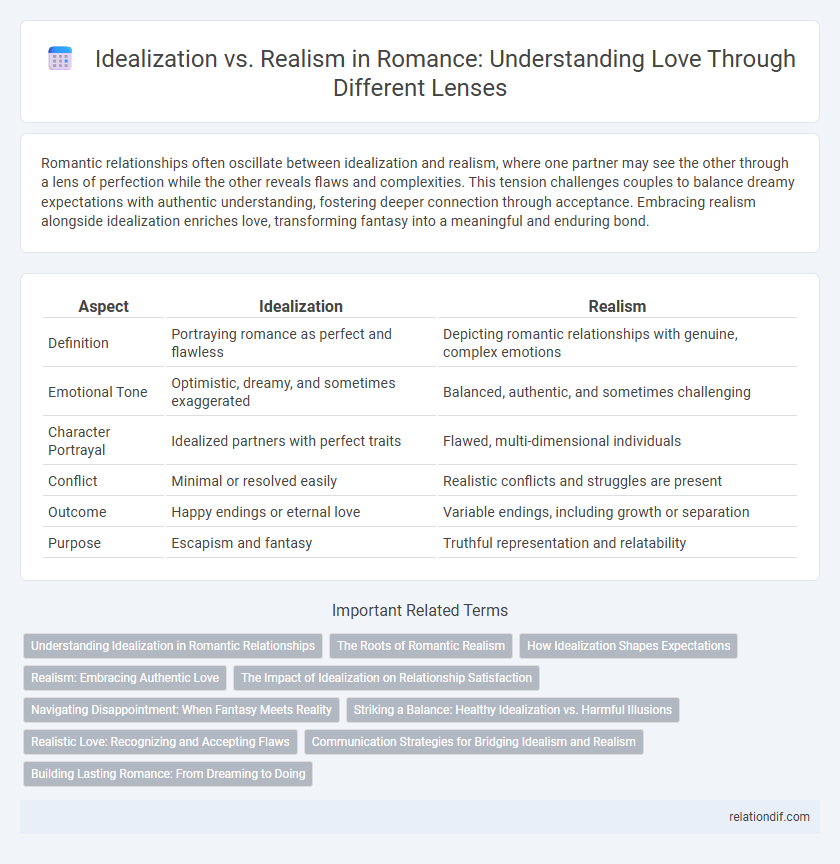Romantic relationships often oscillate between idealization and realism, where one partner may see the other through a lens of perfection while the other reveals flaws and complexities. This tension challenges couples to balance dreamy expectations with authentic understanding, fostering deeper connection through acceptance. Embracing realism alongside idealization enriches love, transforming fantasy into a meaningful and enduring bond.
Table of Comparison
| Aspect | Idealization | Realism |
|---|---|---|
| Definition | Portraying romance as perfect and flawless | Depicting romantic relationships with genuine, complex emotions |
| Emotional Tone | Optimistic, dreamy, and sometimes exaggerated | Balanced, authentic, and sometimes challenging |
| Character Portrayal | Idealized partners with perfect traits | Flawed, multi-dimensional individuals |
| Conflict | Minimal or resolved easily | Realistic conflicts and struggles are present |
| Outcome | Happy endings or eternal love | Variable endings, including growth or separation |
| Purpose | Escapism and fantasy | Truthful representation and relatability |
Understanding Idealization in Romantic Relationships
Idealization in romantic relationships involves perceiving a partner as flawless or attributing exaggerated positive qualities to them, often influenced by emotional desires and expectations. This cognitive bias can lead to unrealistic standards that mask underlying incompatibilities or behavioral issues, impacting relationship satisfaction over time. Recognizing and balancing idealization with realism enables partners to develop deeper emotional intimacy and foster sustainable, authentic connections.
The Roots of Romantic Realism
Romantic realism emerged as a response to the idealization prevalent in early romantic literature, emphasizing authentic human experiences and emotional complexity. Rooted in the 19th-century literary movement, it bridges the gap between the fanciful portrayal of love and the nuanced realities of relationships. This approach highlights characters' flaws and societal influences, revealing love's challenges alongside its beauty.
How Idealization Shapes Expectations
Idealization in romance often leads individuals to form unrealistic expectations about their partners and relationships, emphasizing perfection and overlooking flaws. This cognitive bias skews perception, fostering disappointment when reality reveals human imperfections and complexities. Understanding the influence of idealization helps couples cultivate healthier, more realistic connections grounded in genuine acceptance and empathy.
Realism: Embracing Authentic Love
Realism in romance centers on embracing authentic love by acknowledging flaws and imperfections in both partners, fostering genuine emotional connections. It prioritizes honest communication, mutual respect, and realistic expectations to build lasting relationships. This approach encourages growth through acceptance and challenges idealized fantasies that often lead to disappointment.
The Impact of Idealization on Relationship Satisfaction
Idealization in romance often inflates partner expectations, leading to heightened initial satisfaction but increased vulnerability to disappointment as real traits emerge. Research shows that excessive idealization can impede genuine intimacy by obscuring authentic compatibility and fostering unmet emotional needs. Balancing idealistic views with realistic perceptions enhances long-term relationship satisfaction and resilience.
Navigating Disappointment: When Fantasy Meets Reality
Romantic idealization often sets expectations that clash with the complexities of real relationships, leading to inevitable disappointment. Embracing realism helps partners appreciate authentic emotions and imperfections, fostering deeper connections. Navigating this balance requires honest communication and acceptance of both fantasy and reality in love.
Striking a Balance: Healthy Idealization vs. Harmful Illusions
Striking a balance between healthy idealization and harmful illusions in romance involves appreciating a partner's virtues without ignoring imperfections, fostering realistic expectations that nurture genuine connection. Healthy idealization encourages hope and positive motivation, enhancing emotional intimacy while harmful illusions can lead to disappointment and mistrust when reality contradicts fantasy. Cultivating this equilibrium promotes sustainable relationships built on mutual respect and authentic understanding.
Realistic Love: Recognizing and Accepting Flaws
Realistic love embraces the imperfections and vulnerabilities of both partners, fostering a deeper connection through genuine acceptance rather than idealized fantasies. It acknowledges that flaws such as jealousy, insecurity, and past mistakes are part of human nature, creating opportunities for growth and empathy within the relationship. This perspective promotes sustainable intimacy based on authenticity and mutual respect, contrasting sharply with the unrealistic expectations often perpetuated by romantic idealization.
Communication Strategies for Bridging Idealism and Realism
Effective communication strategies for bridging idealization and realism in romance involve active listening and expressing authentic emotions without distortion. Couples benefit from setting clear expectations while acknowledging imperfections, fostering mutual understanding and emotional honesty. Employing empathetic dialogue and validating each other's perspectives helps reconcile unrealistic ideals with practical relationship dynamics.
Building Lasting Romance: From Dreaming to Doing
Building lasting romance requires balancing idealization with realism, where partners embrace each other's flaws while nurturing shared dreams. Recognizing that love evolves beyond initial fantasies fosters deeper emotional intimacy and sustainable connection. Practical commitment combined with empathetic understanding transforms romantic ideals into enduring partnerships.
Idealization vs Realism Infographic

 relationdif.com
relationdif.com